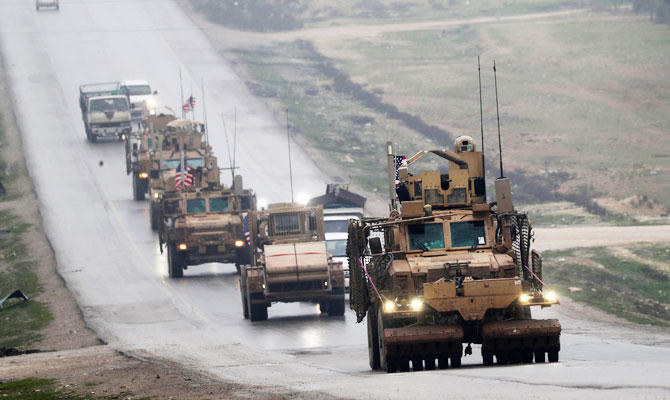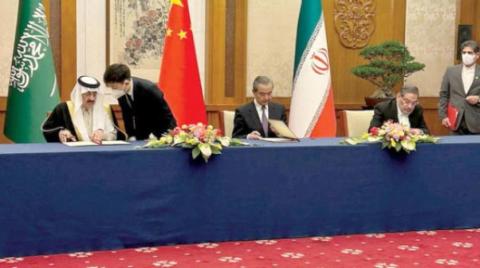
Every time Americans run for the exits during a war or insurgency or after a terrorist attack, the human suffering and pain does not come to an end. What usually ends is the intense reporting on the topic because the elite-media spotlight shifts to a torrent of overanalyzing, book-writing and filmmaking by contrite American veterans and officials, now safely back in their homeland.
This has happened since the 1960s like a geopolitical show running on a loop, with just the location and actors changing through the years (Vietnam, Lebanon, Iraq, Afghanistan). Since the abandoned allies of Washington and the local populations tend to be non-native English speakers with little or no clout in distant Washington, they are inevitably condemned to a life of danger and deprivation, if not forced “re-education.”
No wonder pro-Western countries with a sense of history nowadays hesitate to put all their security eggs in the American basket, the logic being: With unreliable friends like these, who needs reliable enemies.
Take Afghanistan — the scene of one of the world’s worst humanitarian crises since the botched withdrawal of US and NATO forces in August 2021 paved the way for the country’s second takeover by the ultraconservative Taliban.
Even by the standards of this war-ravaged country, the current state is pitiful. Almost two-thirds of the population needed humanitarian aid last year, with 14.7 million requiring it for basic survival. The UN reported that, by mid-2023, 4 million Afghans were acutely malnourished, including 3.2 million children under the age of five.
After seizing power, Taliban authorities cracked down on local media and increased the use of arbitrary detentions for journalists, human rights defenders and civil society activists. Last August, the UN reported that, in the last 12 months alone, there had been at least 800 instances of extrajudicial killing, arbitrary arrests and detentions, more than 144 cases of torture and brutal treatment, 218 extrajudicial deaths and 14 enforced disappearances of former government employees and security personnel by Taliban forces.
Hasty US military pullouts have happened since the 1960s like a show running on a loop, with just the location and actors changing
Arnab Neil Sengupta
As for women and girls, Human Rights Watch has said the pattern of abuses against them amounts to the crime against humanity of gender persecution.
Looking back, Iraqis have actually fared much better than Afghans, but when you come to think of it, just 10 years ago, as Daesh militants rampaged across the country, it was touch and go there too for a while.
Going back further, when a US presidential candidate pledged in 2007 to pull the remaining combat brigades out of Iraq at a pace of about one per month, it signaled to malign regional actors and America’s own adversaries that the end of the democracy-building project, and the time for them to swing into action, was near.
When the 2008 US-Iraq Status of Forces Agreement expired, the Democratic administration proved unable or (more likely) unwilling to use economic and military leverage to get a new agreement ratified by the Iraqi parliament.
President Barack Obama’s declaration in October 2011 that he was “ending the war in Iraq” turned out to be no more prophetic than Republican President Richard Nixon’s announcement in January 1973 that a treaty just signed in Paris would bring “peace with honor” and ensure South Vietnam’s independence.
Nearly 13 years on, Iraqis are caught in the crossfire of a shadow war between Iran and Israel, with American forces once again intervening, this time not to quell an insurgency or stamp out a sectarian civil war but to target nonstate armed groups backed by Tehran and operating from Iraqi soil. The head of the UN political mission in Iraq recently said that the spiraling regional violence could leave the country on “a knife-edge.”
It is not just tension among different ethnic and religious factions that stands in the way of national unity and effective governance. Gallup data published in February showed that 86 percent of Iraqis believe corruption is widespread in government, while three-quarters believe that elections are not honest in Iraq.
Although Iraqis’ faith in their political and national institutions rose last year, including confidence in the national government, and 39 percent said now is a good time to find a job, the Heritage Foundation’s 2024 Index of Economic Freedom report noted that “the weak state of the financial system, coupled with its limited role in the economy, makes development of a much-needed dynamic private sector extremely difficult.”
Compared with both Iraq and Afghanistan, the people of Vietnam are a lot better off today than they were when the last US military unit left the country in March 1973. Since 1986, the Vietnamese authorities have used structural reforms to modernize the economy and build competitive, export-driven industries. But in political terms, the more things have changed, the more they have stayed stuck in a time warp.
The complete withdrawal of US forces did not end the war for the Vietnamese and brutal fighting continued until April 1975, when Saigon fell to the communists. The 1976 reunification of North and South Vietnam triggered a mass flight of so-called boat people, including successful South Vietnamese merchants, who were fearful of execution or relocation to labor camps and were desperate for a better future. By mid-1979, some 350,000 Vietnamese had sought refuge throughout Southeast Asia, with another 200,000 moving to permanent residence in other countries.
Although these immigrant communities eventually proved successful and descendants of the boat people can now freely enter and leave the country, Vietnam remains a one-party communist state, in which a small class of oligarchs control private conglomerates.
This week’s naming of the minister of public security as the country’s new leader is unlikely to boost Vietnam’s score in Freedom House’s annual “Freedom in the World” report. A New York Times report described the new president as “the third person in the job in less than 18 months amid jostling ahead of a generational change in leadership,” while noting that Vietnam ranks 83rd out of 180 countries on Transparency International’s corruption index.
“The winners of this power struggle are the hard-liners: the police generals and the dogmatic Leninists,” Bill Hayton, an associate fellow at Chatham House, wrote in a recent expert comment, conjuring up memories of the Vietnam War-era The Beatles song “Back in the USSR.”
None of this is to argue in favor of Americans starting wars, even if they could somehow develop the strategic patience to see them through to the end. But one thing they should definitely do is produce less cultural, literary and media content fixated on a fading American imperium when countless stories of the victims of US betrayals and withdrawals remain untold.
• Arnab Neil Sengupta is a senior editor at Arab News. X: @arnabnsg












